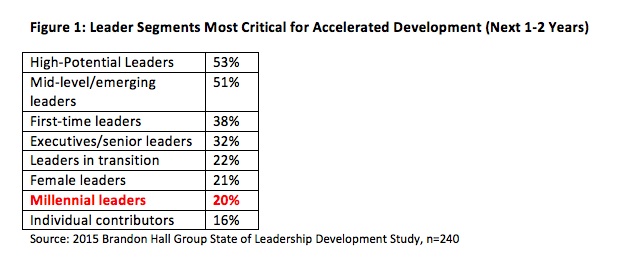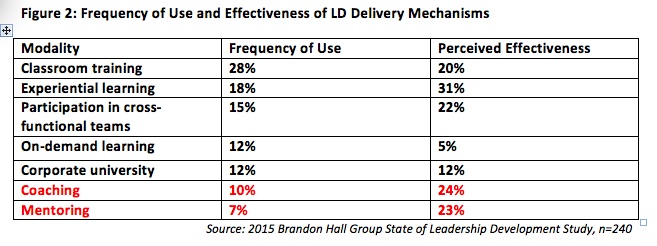
More than one-third (35 percent) of organizations in Brandon Hall Group’s 2015 State of Leadership Development Study described their leadership development practices as below average or even poor. More than half of organizations (51 percent) said their leaders are not prepared to lead today, and 71 percent said their leaders are not prepared to lead into the future. Survey research and interviews with executive and senior business leaders offered keen insight on leadership gaps, especially related to Millennials:
- Organizations do not see accelerated development of Millennial leaders as important. Just 20 percent of organizations surveyed identified the Millennial leader segment as critical for development over the next 24 months.
- Technology should be better utilized to appeal to the development desires of Millennial leaders. In the eyes of Millennials, education and technology are inseparable. But technology-based development approaches rank in the bottom 10 of most frequently used leadership development delivery methods.
- Organizations are not investing in coaching and mentoring of Millennial leaders. Millennial leaders crave advice and insights, particularly from senior leadership. But, on average, just 7 percent of organizations invest in offering Millennial leaders coaching, mentoring, and dedicated time with their CEO and other senior leaders.
Organizations are targeting a variety of leader segments—including high-potential, emerging, and first-time leaders—for accelerated development. But while some of those groups may include some Millennials, they have not prioritized Millennials specifically as needing accelerated development. We believe this is a mistake because of some unique traits, characteristics, and needs of Millennials.

Who Are the Millennials?
Millennials, those born after 1977 and in their 20s and early 30s today, also are known as Generation Y. Individuals from this generation will begin leading your organizations in the next couple of years, and moreover, soon will represent the greatest portion of your total employee population.
Millennials are changing the rules of the world we live in and the places we work. They are creating new business opportunities for organizations everywhere. Our research identified at least three. Millennials are keen to:
- Maximize technology utilization for on-demand information
- Spur and embrace change
- Grow global exposure and experience
High-performing organizations respect the new business opportunities Millennials bring and are open-minded to their new ideas and fresh way of working. They are accelerating their development in fashions that align with Millennials’ values and the new opportunities they bring. High-performing organizations are taking at least four crucial actions to engage Millennials and prepare them for success:
1. Coach and Praise
For a variety of reasons, including the way many were raised and the societal and economic conditions they have been exposed to, many Millennials have a strong fear of failure and accompanying anxiety. To combat their angst and set themselves up for the greatest probability of success, their first-choice employer is one who invests in their ongoing learning and perpetual development. Millennials crave frequent attention, regular advice, and continuous sharing of insights. They seek attention, particularly from the CEO and other senior leaders. To these points, they seek out organizations that provide personal support systems, particularly in-person, one-to-one coaching and mentoring from an organization’s most senior leaders, and online “Ask Me” tools where their questions go straight to the CEO’s inbox. In our research, organizations identified coaching as the second most effective leadership development approach (behind only Experiential/On-the-Job Learning), yet in near last place regarding how frequently it is used. The same story prevails with mentoring—highly effective and rarely used. Bearing in mind the needs of the Millenials, in our 2015 State of Leadership Development Study, 61 percent of organizations plan to increase their use of coaching and mentoring over the next 12 months.

Millennials count on their managers and senior leadership to help them understand how to effectively navigate corporate challenges and be independent decision-makers invited frequently to take on new and more responsibility. Our research revealed that many Millennials believe their work responsibilities are well below their skill set, and they tend to quickly abandon a work environment they perceive is not matching their talents and offering accelerated growth.
2. Offer “Tours of Duty”
A “tour of duty” is the opposite of what traditionally has been known as long-term, stable jobs in which the employer and employee have a marriage contract of sorts. As an alternative to the “stay here forever” path, Millennials are keen to join organizations that allow them to commit to one or two years, achieve one great thing, and then take on another mutually defined mission or go to a different organization and complete their next great thing there.
Unlike previous generations, most Millennials are planning to do work for several organizations over the few number of years they plan to work. Our data indicates that almost three-quarters of Millennials (73 percent) plan to work for five or more different employers over the next five-year period, and most plan to retire long before their parents do or did.
In most organizations today, the business environment mimics that of tours of duty—rapid and continuous change and provocative innovation—the very environment in which Millennials thrive. Millennials can be described as highly adaptable, entrepreneurial types who are motivated to out-network, out-risk, and outperform their peers. Their agile and flexible personalities fall right in line with employment arrangements that don’t make long-term promises of job stability, but instead promise continuous development in preparation for the next exciting “tour”—at the same company, or another.
Tours of duty allow both the employer and the employee the mutual benefit of alliance. The employer promises to make the Millennials more valuable if the Millennials make the organization more valuable, and the Millennials promise to make the organization grow and flourish if the organization promises to invest in growing their skills and talents.
3. Keep Technology at the Forefront
Millennials are digital natives embracing today’s technology advances. Millennials have grown up on technology and appreciate its role in eliminating bureaucracy and enabling instant access to lots of information and people around the world. They expect to use social tools and mobile devices to get work done on their schedule and from anywhere at anytime (and not always the same time), to gather heaps of information on-demand, and to learn and grow. They are accustomed to their social tools and mobile devices throwing content at them in a highly visual way. Consequently, their appetite for images, videos, and infographics is large, and conversely, they have no room for long forms of content that are text heavy.

One of the best ways to engage Millennials is to encourage their tendency to engage with technology in any way they can, and weave in opportunities for social and mobile technology utilization during their learning and development. In the classroom, this may mean using Twitter to have groups share the results of a small group discussion, or Instagram to share photos of their strategy plan with each other. Online, it may mean providing links that learners can access, or information feeds pushed to learners after their formal classroom training if they want to learn more. And, most certainly, it means designing learning content Millennials can access as they wish and when they wish on their laptop, tablet, or other mobile device.
4. Build a Collaborative and Social Culture
Millennials are largely social people and simply value collaboration. They enjoy in-person and virtual collaboration as frequently as possible. To get work done, they rely on their digital prowess, social tools, and mobile devices to enable their connection to senior leaders, to peers, and to their professional and social networks inside and outside of work. To this point, they gravitate to organizations that formulate cross-functional teams to encourage innovation and idea sharing, that assign group-based work such as action learning teams or special assignment teams to prompt innovation and creativity that often spurs from group-think opportunities, and that enable peer networking during onboarding and work assignments. This generation needs to feel connected, involved, and the camaraderie of being an invaluable member of a team or a community.
Our research indicates that more than half of organizations (54 percent), on average, recognize the business value of immersing Millennials in cooperative and social development, but few (27 percent) have yet to prioritize team and social learning opportunities that prompt the transformation to a collaborative and social culture.
The new workforce knows collaboration, needs to collaborate, and feels empowered to collaborate with anyone, anywhere. While Millennials have not yet flat-out rejected corporate environments that are less than collaborative, if they are unable to find workplaces that are avidly working toward accommodating and promoting collaborative environments, our interviews with executives indicate they believe the Millennials will seek other options without hesitation.
Laci Loew is vice president and principal analyst in Talent Management at Brandon Hall Group, an independent human capital research and advisory services firm. It provides insights around key performance areas, including Learning and Development, Talent Management, Leadership Development, Talent Acquisition and HR/Workforce Management.



